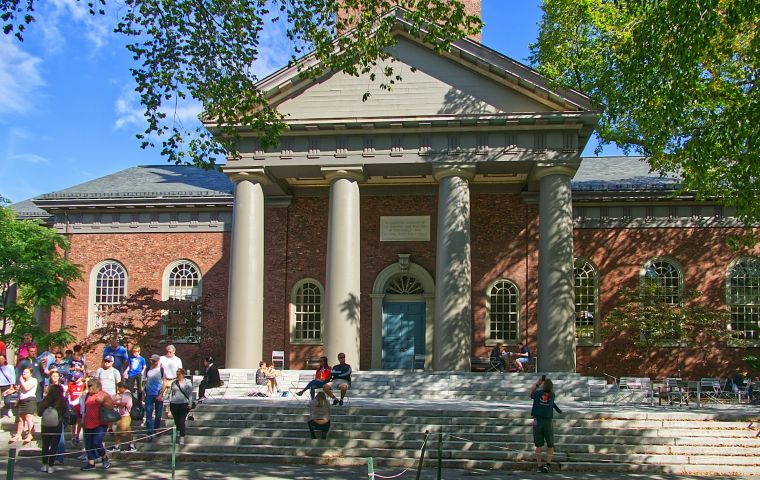MercoPress. South Atlantic News Agency
Top 10 Study Tips to Study Like a Harvard Student
 Photo: Unsplash
Photo: Unsplash Success at top universities is often less about innate brilliance and more about discipline, structure, and smart strategies. If you have ever wondered how to study effectively and achieve top results without burning out, this is the guide for you. By adopting some of the same techniques used by high-performing students at elite schools, you can transform your academic habits and see tangible results.
At the heart of every successful study strategy is a reliable support system. Many students rely on campus resources, peer groups, or external academic assistance. For example, students who want structured guidance often turn to professional academic services for help with paper, ensuring they have both the time and mental space to focus on demanding coursework. This combination of personal effort and smart resource use can dramatically improve overall performance.
Let’s explore the top ten approaches that Harvard students often use to stay at the top of their game.
Master Active Recall
Top students rarely rely on passive reading. Instead, they use active recall to strengthen memory and deepen understanding. This involves closing the book after reading a section and trying to explain it from memory, or writing down key concepts without looking. The goal is to force the brain to retrieve information, making it more likely to stick. Over time, this technique transforms short-term knowledge into long-term mastery.
Use Spaced Repetition
Rather than cramming the night before exams, Harvard students space their review sessions over days or weeks. This scientifically backed method improves retention and reduces stress. By reviewing material at increasing intervals, such as after one day, then three, then a week, you give your brain repeated opportunities to consolidate information. Apps and flashcard tools can automate this schedule, making it easier to stay consistent.
Schedule Focus Blocks
One of the most overlooked studying tips is learning how to structure time effectively. Top students create daily or weekly study blocks, dedicating uninterrupted periods to specific subjects. These blocks typically last 50–90 minutes and are followed by short breaks to reset focus. The key is to treat these blocks like appointments you cannot miss, which helps maintain accountability and prevents procrastination.
Take Comprehensive Notes
Harvard students are known for meticulous note-taking. They don’t transcribe lectures verbatim; instead, they summarise key ideas, add personal commentary, and create quick visual structures like tables or diagrams. This makes the material easier to revisit later. Developing your own shorthand system can save time during lectures and help you focus on understanding rather than just recording.
Prioritize Deep Work Over Multitasking
Multitasking is the enemy of quality studying. Instead of switching between tabs, apps, and messages, elite students immerse themselves fully in one task at a time. Deep work means putting phones away, closing distractions, and working with complete attention. Even a single uninterrupted hour of such focused study can produce more results than three scattered hours.

Photo: Unsplash
Ask Smart Questions
Curiosity is central to academic excellence. Students who excel at Harvard rarely accept information passively. They constantly ask questions during lectures, in study groups, or while reviewing alone. This habit pushes them to explore concepts in depth and see connections between topics. For example, if you’re learning a new theory, try asking yourself: How to study effectively? Tailoring strategies to each discipline can make your learning process more precise and efficient.
Strategic Use of Academic Support
Students at elite universities understand that success often involves knowing when to delegate and seek expert assistance. Many Harvard students use external platforms like MyPaperHelp to manage their workload more efficiently. Education strategist Sophia Bennett observes that incorporating professional paper writing help allows students to allocate their time to the most demanding courses while still maintaining consistently high standards across all assignments. This strategic use of support is less about shortcuts and more about smart time management.
Develop Exam-Specific Strategies
Knowing how to study effectively in college often means understanding different exam formats. Harvard students tailor their preparation for multiple-choice tests, essay exams, and problem sets differently. For example, for essay-based exams, they outline potential responses and practice writing concise arguments under time pressure. For problem sets, they focus on mastering underlying principles rather than memorizing solutions.
Take Care of Your Body and Mind
Academic excellence isn’t just about books. Top students recognize that sleep, nutrition, and mental health directly influence cognitive performance. Regular exercise, adequate rest, and healthy eating habits keep the brain sharp and energy levels stable. Mindfulness or brief meditation sessions can also improve focus and reduce anxiety during demanding study periods.
Review and Adjust Regularly
The final tips for studying effectively involve self-reflection. High achievers regularly evaluate what’s working and what isn’t in their study routines. If a method isn’t yielding results, they modify it rather than sticking to unproductive habits. Weekly check-ins to assess progress, identify weak points, and plan improvements help maintain steady growth throughout the semester.
Bringing It All Together
Learning like a Harvard student involves adopting their mindset and applying it to your own routines. They approach studying as a deliberate, structured process, not something to improvise at the last minute. By combining active recall, spaced repetition, strategic scheduling, and consistent self-evaluation, you can significantly elevate your academic performance.
Importantly, success also involves knowing when to seek support. Whether it’s turning to classmates, professors, or professional academic assistance, smart students recognize that excellence is rarely achieved alone. They plan ahead, use resources wisely, and maintain a balance between effort and well-being.
If you start implementing even a few of these strategies today, you’ll begin to see the difference in your concentration, retention, and confidence. Over time, these habits compound, helping you achieve results that mirror those of the world’s most prestigious institutions.




Top Comments
Disclaimer & comment rulesCommenting for this story is now closed.
If you have a Facebook account, become a fan and comment on our Facebook Page!